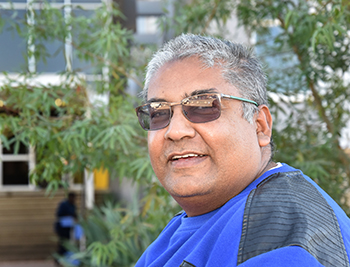Latest News Archive
Please select Category, Year, and then Month to display items
18 November 2024
|
Story Jacques Maritz
|
Photo Supplied
 Muhammad Cassim, a second-year student in the Department of Engineering Sciences in the Faculty of Natural and Agricultural Sciences.
Muhammad Cassim, a second-year student in the Department of Engineering Sciences in the Faculty of Natural and Agricultural Sciences.
Muhammad Cassim, a second-year student in the Department of Engineering Sciences in the Faculty of Natural and Agricultural Sciences at the University of the Free State, will participate in the winter university project in Pskov, Russia, from 25 November to 9 December 2024.
The winter school aims to strengthen relationships among young engineers and deepen international interaction via skills improvement, joint projects, and social cohesion. The programme boasts a densely packed education block, project block, and cultural block.
Cassim is part of the UFS Grid Related Research Group and actively participates in research centred on complexity science. He intends to complete his BSc Physics degree with Engineering subjects and progress towards postgraduate studies in the UFS Department of Physics.
He is currently working on verifying experimental developments in the field of synchronisation in complex networks. While he has already completed this high-performance computing training in his first year under the leadership of Albert van Eck (Director, UFS E-research), he is looking forward to the masterclasses in holographic modelling, deep learning, direct laser deposition, and database. Closely resembling his current research, he will have the opportunity to gain more experience in the use of set theory and graph theory in solving digital information processing problems.
For more information about international scholarships for study abroad opportunities, contact Mbali Moiketsi in the Office for International Affairs.
Cassim’s student profile is the culmination of the department’s strategy to produce young applied scientists who are subjected to the culture of research during their undergraduate study and could articulate with ease to other departments for postgraduate studies. The department aims to align with the UFS’ Vision 130 by producing competitive students who can operate in the postgraduate paradigm with the digital themes of veterinary science and ecological engineering science.
Prof Solomon appointed to board of flagship journal of UNECA
2016-10-06

Prof Hussein Solomon, member of the Editorial
Board of the Afro-Arab Social and Economic
Review. He is also the author of Islamic State
and the Coming Global Confrontation.
Photo: Charl Devenish
“I cannot say I worked towards it – I just did my work, and I guess someone noticed.” These are the words of Prof Hussein Solomon from the Department of Political Studies and Governance at the University of the Free State (UFS), who was recently appointed to the Editorial Board of the Afro-Arab Social and Economic Review.
On an editorial board with people he quoted
This is the flagship journal of the United Nations Economic Commission for Africa (UNECA). The mandate of the Economic Commission for Africa (ECA) is to promote the economic and social development of the states which are regarded as members of the United Nations (UN). Prof Solomon says the board consists of people that he used to quote when he was a student, and to serve alongside them is a privilege.
Book launched in Greece, Japan, and Indonesia
His book, Islamic State and the Coming Global Confrontation, was earlier published by Palgrave Macmillan in London and launched in Greece, Japan, and Indonesia in June and July 2016 respectively. It analyses the origins and organisational structure of the Islamic State (IS), ans examines its military triumphs and success in securing new recruits via social media.
Exploit of IS vulnerabilities to combat organisation
Prof Solomon says the IS makes use of the winning hearts and mind (WHAM) principle where they earn the trust of residents by providing basic services, and the only solution we have is to “exploit the Islamic State’s vulnerabilities and to highlight their atrocities.”
He mentions that a lot needs to be done to overcome the IS. It is vital to have boots on the ground and an acceptance that countries will splinter. An overarching strategy needs to be in place which allows for regional variations, good governance, and the countering of extremism.